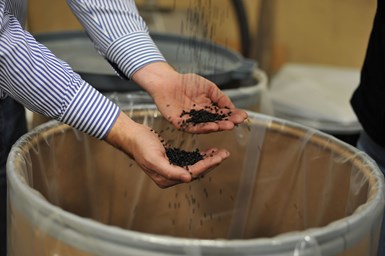Bay Plastics Offering Free Pelletizing Trials
Lab trials and offers two types of extruders, two models of pelletizers, and manual strand or auto strand pelletizing capabilities.
Bay Plastics Machinery (BPM) is opening its lab in Bay City, Mich. to customers and prospects that would like to test processes and materials using Bay’s industry-leading equipment and expertise.
BPM is offering free lab trials and offers two types of extruders, two models of pelletizers, and manual strand or auto strand pelletizing capabilities.
The equipment inventory available for evaluations includes:
• A 53 mm twin-screw extruder for producing pellets 1 mm and larger.
• A 30 mm single-screw extruder to produce micropellets from 1 mm down to 0.2 mm — or as small as the application requires.
• Z08 and AXP08 midsize pelletizers, capable of producing up to 40 1/8-in. strands simultaneously (typical lab trials for these pelletizers use dies from two to eight strands).

Photo: Bay Plastics Machinery
• Nine-ft and 20-ft WBX Series cooling systems; BPM’s water baths feature variable flows and heights for most extrusion line needs.
• Various sizes of wet-cut water slides, with a self-contained recirculation/filtration system and a spin dryer.
• Twelve-ft and 20-ft flash-off conveyor belt systems that dry and cool strands by removing moisture with evaporation, then conditioning strands with heat prior to pelletizing.
“Customers and potential new customers who take advantage of this opportunity to profile their projects and test their materials in our labs have the opportunity to tap into a wealth of pelletizing knowledge,” says Jim Forgash, BPM v.p. sales. “We are experts in extrusion and pelletizing, and can help customers decide on the best machinery and equipment for their material needs.”
BPM has developed a form for customers and prospects to fill out and return to take advantage of this new free lab trial service.
Related Content
-
Small Batches, Big Success
With no minimum order and an impeccable record of on-time delivery, Precision Color Compounds is becoming a force in the color masterbatch business.
-
Configuring the Twin Screw Extruder: Part 4
For many compounding operations, material is fed to the extruder at the feed throat. This is the case when feeding a single polymer or a blend of polymers mixed with solid additives. Some ingredients, however, present a challenge in feeding. Here’s how to solve to them.
-
Engineering Resins Compounder Expands to Take on More Scrap
Polymer Resources responds to sustainability push by upgrading plant with grinding and shredding equipment to take on both postindustrial and postconsumer reclaim.














